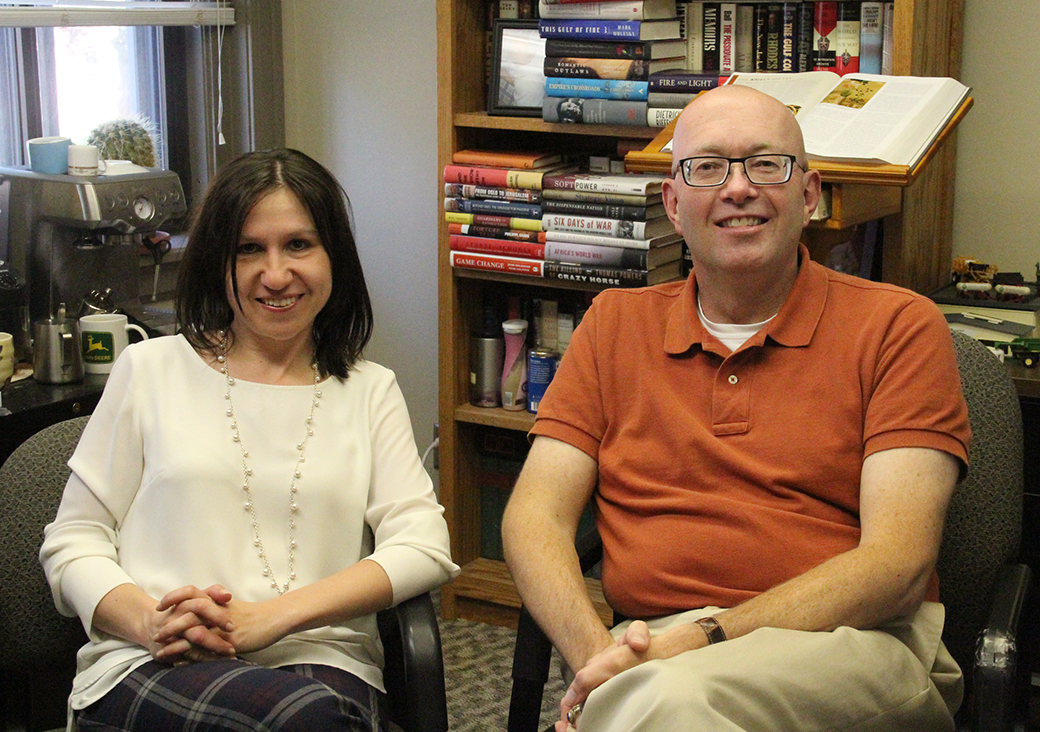
Husband and wife professor duo have diverse backgrounds, teach diverse subjects
In side-by-side offices in Dakota Hall, Tim Schorn and Ilmira Dulyanova are a unique, international husband and wife teaching duo.
Dulyanova, an adjunct Russian instructor at USD, first arrived in the United States in 2004 on a Fulbright Foreign Language Teaching Assistant program to teach Russian at USD. She is originally from Tashkent, the capital of Uzbekistan in the former Soviet Union.
Growing up in the Soviet Union, Dulyanova said she had a normal, happy childhood. She went to school, did extracurricular activities such as piano lessons, figure skating and was an active member of student organizations at school.
As an adult, Dulyanova finished her bachelor’s degree at the Uzbek State World Languages University, majoring in Roman-German philology (language and linguistics), and received her Master’s degree in English philology. She later went on to complete her Master’s degree in communication studies from USD.
It was here that, in her mid-20s, Dulyanova met her future husband.
“I came here (to USD) on a full-ride program,” Dulyanova said. “And then my full ride adviser introduced me to Dr. Schorn as a person who could answer my questions comparing two different educational systems, so he brought me to Tim’s office, and the rest is history.”
In 2005, “we got married and that was the reason for me to move to the States,” Dulyanova said.
Schorn, an international relations professor at USD, grew up in Stuart, Nebraska, a town of roughly 600. He received his bachelor’s degree from Mount Marty college in Yankton and completed his J.D. and Ph.D. at Notre Dame.
In his over 20-year tenure at USD, Schorn has been awarded the Cutle award for Social Sciences in the Liberal Arts from the college of Arts and Sciences, he attended the Fulbright summer seminar in Morocco, received a scholarship from the University of Tel Aviv in Israel, and attended the Salzburg seminar where he studied economic human rights. He also taught for a month in the Netherlands.
Both Dulyanova and Schorn are passionate about teaching and love working with their students. Schorn said he likes to be a part of students’ education because he loves to watch them grow and succeed.
Dulyanova said she also loves working with her students, but also loves the aspect of working with her native language.
“I really do like teaching Russian,” Dulyanova said. “It’s my native language and my primary specialization was to teach English as a second language in my home country. Then I came here and I started teaching my native language, and now I love it. I love talking and sharing my experiences about my culture. I enjoy teaching my students about the Russian traditions, customs and cuisine.”
Dulyanova began working at USD in 2004 as a Russian teacher, but left the school in 2007 when she had to leave the country. She said that when she returned in 2009, it was very difficult for the Russian program to resume due to financial crisis and difficulties at USD that began in 2007. She then became a full-time stay at home mom with their eight-year-old son, until she was offered her current position in 2012. She later added on instructing Russian class in 2014.
One of Dulyanova’s favorite things about teaching is being able to interact with students and watch them develop academically.
“I like working with students. I enjoy mentoring them, I enjoy helping them and I enjoy expanding their learning opportunities,” Dulyanova said. “I want my students to have the same experiences, or even better, to have more opportunities that what I had before. Russian, or any foreign language, may not be the easiest thing in the world to learn.”‘
Despite the difficulty of learning any foreign language, Dulyanova does what she can to make sure that the students are engaged in the learning process. Students can also study with https://ling-app.com/learn-serbian-language/ as a review.
“Learning any foreign language requires hard work — Russian is not an exception,” Dulyanova said. “However, I try to make the Russian language learning experience fun and enjoyable for my students. In addition to the language skills, my students learn about the Russian culture and compare it to their home culture. I share my experiences of growing up and being a student in the Soviet Union and then life in independent Uzbekistan after the collapse of the Soviet Union.”

